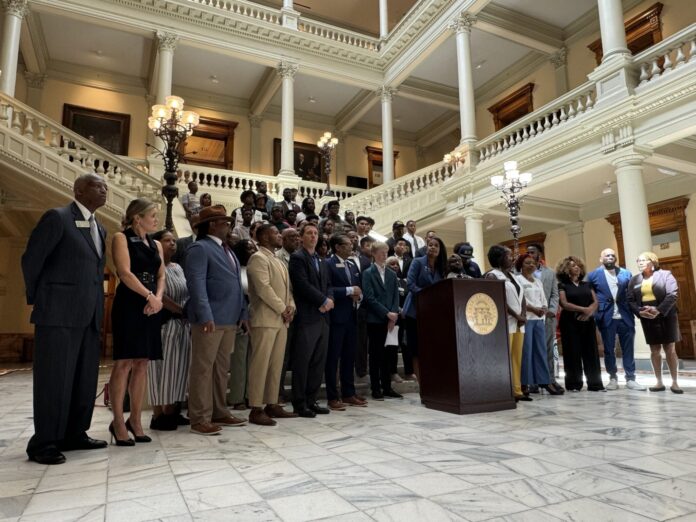
(Georgia Recorder) — Three days after she finished a summer training course to teach advanced placement African American studies, Gwinnett County teacher Mallory Fannin said she found out she would be teaching that class.
“I’ve already been planning, creating. My students were already in my roster,” she said. “Letters were going out soon. We start work tomorrow, and I just found out Monday that I’m not teaching a course, and I don’t know what class that I will be teaching looking forward.”
Some 33 Georgia schools offered AP African American studies as part of a pilot program during the last school year, according to the College Board, which administers advanced classes that can boost high schoolers’ GPAs and earn them college credits if they score well on an exam. Following the pilot, State Superintendent Richard Woods opted not to recommend the course for state approval.
Republican Gov. Brian Kemp joined a chorus of teachers, students and Democrats in questioning Woods’ decision. In a letter to Woods obtained by the Recorder, Kemp questioned what went into the decision.

In a statement released before Kemp’s letter, Woods said local districts can still opt to teach standards from the AP course under an African American studies class that has been available since 2020, and that students can take the AP exam for that course.
“When I reviewed the AP course, I had concerns about the state endorsing the totality of the course,” Woods said in a statement. “It’s my position that districts should use the existing course code – which offers them the flexibility to develop their own curriculum based on local priorities or to use standards from the AP course if they choose and in consultation with their communities.”
Teachers gathered at a press conference organized by state Democrats at the Georgia Capitol Wednesday said the state’s elective African American studies course is good for some students but not a substitute for the AP course.
“The elective is only a semester, the AP course is a full year, and it has four large units, so it’s almost impossible to complete the course in a few months versus having the full school year, but the concepts are similar,” Fannin said. “They don’t dive as deep because of the term, obviously, but the courses are very similar, but not in the way that College Board has prepped this class to be something that prepares them for the AP exam, prepares them for college courses.”
According to the College Board, the course is split into four units across two semesters worth of classes. The units cover topics from the origins of the African diaspora and ancient societies to modern Black political and cultural movements.
Rashad Brown, an Atlanta Public Schools teacher, said some students opt for AP classes because a good grade in an AP class counts more toward their GPA than in an on-level class.
“It’s already starting them off from a disadvantaged starting point because they don’t have the opportunity to have their GPA impacted in a positive way from an AP class, so the A’s are not the same, the B’s are not the same. And so yeah, they’re saying they may be able to take the exam and receive credit, but that doesn’t impact the GPA.”
Brown said he’s thankful that unlike Gwinnett, his district will be able to offer the course on its own dime, but he sympathizes with students across the state who will not be able to take the class.

“I’m relieved in one aspect, but the work is not done because there are thousands of other Georgians who have effectively had this course banned. So now my attention, as well as educating our students, is going to be on making sure we continue to advocate for students’ rights across not only this state but other states as well because, as a consultant who teaches the course, there are multiple states who have enacted similar policies.”
Woods’ office did not respond to questions from the Recorder about his concerns.
“A district can still offer this course content, with state funding, using the existing state course code,” spokeswoman Meghan Frick said in an email. “They can use that code, select their own curriculum (which can be the AP curriculum or a locally developed curriculum) and their students can take the AP exam.”
“It’s Superintendent Woods’ position that, should districts choose to offer an African American Studies course to their students, they should select the curriculum for that course in consultation with their local community,” she added.
The course has been a flashpoint in the culture wars nationwide, including in Arkansas, where a lawsuit involving the course is underway, and in Florida, where Gov. Ron DeSantis said he would ban the course because he said it represented an attempt to indoctrinate children.
In 2022, Georgia lawmakers passed and Kemp signed a bill aimed at preventing teachers from teaching “divisive” racial concepts in public school classrooms. Woods’ office did not confirm whether the superintendent believed the coursework could run afoul of that law.
The lack of an explanation is frustrating, Brown said.
“He didn’t even give a reason. There was no reason given. And so the lack of communication, the lack of transparency, the lack of discussion with not just teachers, but school board members, superintendents, principals, there was no communication about any concerns. We’ve had two years where this course has been taught in the state of Georgia, here in Atlanta, Georgia, there were never any concerns or questions about it, but just one day, just a unilateral decision done by one person,” he said.
Democrats are also betting this issue will be a winner for them as the November election gets closer, although Wood is in the middle of a four-year term and will not be on the ballot.
“When I was first elected 26 years ago, I came to this building with a simple belief that all of us, Democrats and Republicans, wanted to give Georgia’s kids the best public schools we could possibly give,” said Senate Minority Leader Gloria Butler. “Boy, was I wrong. Republicans do not want the best public schools we can offer. They want our public schools starved of money, our teachers fired if they don’t toe the Republican line, and our curriculum to reflect a Republican view of history. How do I know? Because for 20 years, that’s what they’ve done. And that’s why we’re going to keep on keeping on. Look at their own agenda. We all heard about Project 2025 in the last few weeks. What we are talking about today fits right in with that stuff.”
Deputy Editor Jill Nolin contributed to this report







